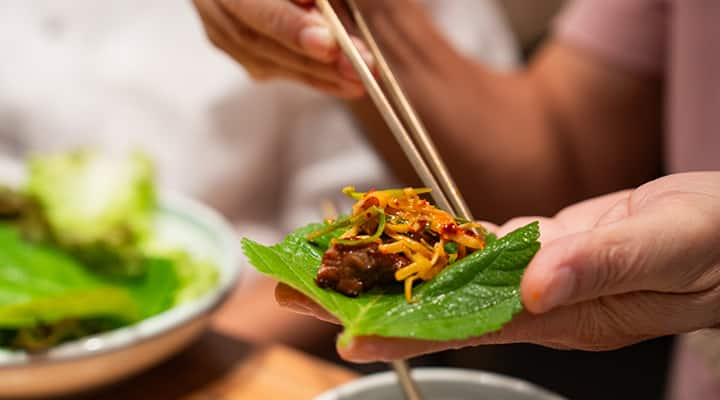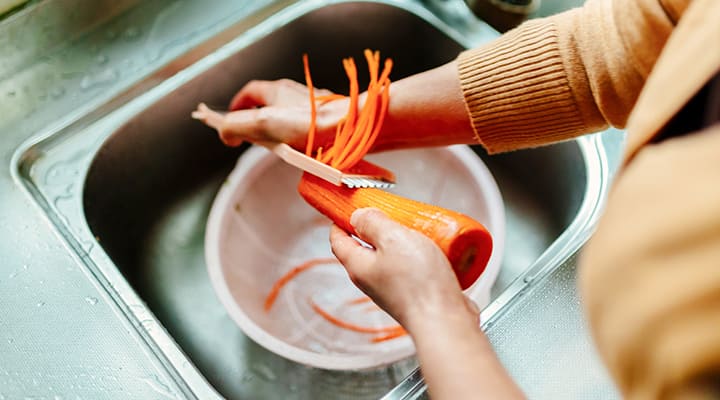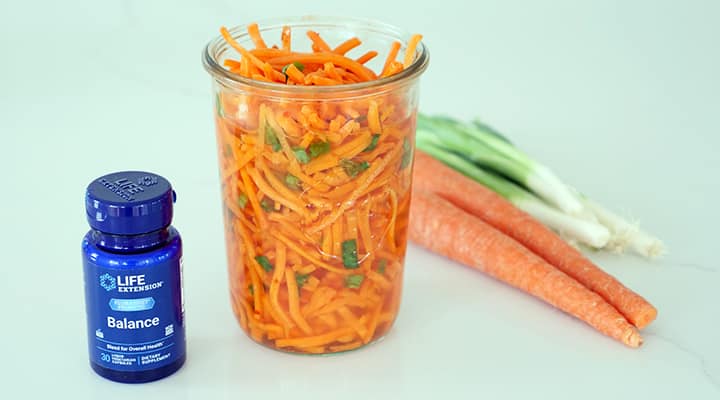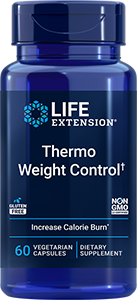
Carrot Kimchi: A Spicy and Delicious Probiotic Recipe
Published: July 2024
You might see kimchi lining grocery store shelves, but did you ever think to make your own at home? Home fermentation can be an intimidating process, but by following simple food safety steps, you can transform fresh veggies into this gut-loving condiment.
Kimchi is traditionally made with napa cabbage and radish, but this recipe puts a unique spin on classic kimchi with shredded carrots as the star ingredient. This carrot kimchi is simple and delicious. Once you have prepped and seasoned your carrots, simply let the fermentation process take over. This will naturally enhance the flavors, preserve the vegetables, boost their nutritional value, and help develop the probiotic bacteria that make kimchi so good for you.
This flavor-packed carrot kimchi can be enjoyed on its own as a side dish, added to a salad, wrap or rice bowl, or used as a topping for tacos.
Spicy carrot kimchi recipe
While this recipe calls for the use of common items easily found in your grocery store, such as carrots, ginger and spring onion, it also has some unique ones that may require more digging.
Gochugaru chili flakes are a key component of this spicy carrot kimchi. This Korean ingredient is made from red chili peppers that are dried and ground into coarse flakes. They impart a slightly sweet and smoky flavor to the kimchi.
Fish sauce is another key element in kimchi that adds umami flavor. For a plant-based alternative, a teaspoon of soy sauce will add a salty savory flavor to your fermented vegetables.
Prep time: 20 minutes
Initial fermentation time: 1-5 days
Servings: 16 servings
Ingredients
Brine
5 tsp iodine-free salt
4 cups filtered water
Kimchi paste
1-3 tbsp gochugaru (scale up or down for desired heat)
1 tsp fish sauce
1 tsp fresh ginger root, peeled and minced
2 cloves garlic, minced
Vegetable base
¾ lb. carrots, julienned
4 spring onions, trimmed and chopped
Preparation
Make the brine
. Dissolve the salt in water and set aside.Make the kimchi paste
. In a small bowl, combine the gochugaru, fish sauce, ginger and garlic until a smooth paste forms. Set aside.Prepare the vegetables
. In a large bowl, toss together the carrots, spring onion and prepared paste. Mix well, ensuring all the vegetables are coated. Pack the mix into a clean 1-quart glass jar with a canning lid and cover with the brine. Leave some space at the top of the jar because the kimchi will expand during fermentation.Let it ferment
. Place the jar of carrot kimchi on a small plate to catch the overflow that may occur during fermentation. Leave the jar at room temperature out of direct sunlight for 1-5 days for the initial fermentation phase. Check on it daily to determine if the kimchi is actively fermenting. Bubbles should begin to form, and it should develop a sour, tangy smell similar to sauerkraut. If it needs more time, press down on the vegetables with a clean spoon to keep them submerged in the liquid and check again tomorrow.Move it to the refrigerator
. Once your spicy carrot kimchi reaches your desired level of fermentation, transfer the kimchi to the refrigerator, where it will continue to ferment slowly in the fridge and develop more flavor over time. Kimchi can be refrigerated for up to a few months.
Nutritional values per serving
Calories: 24
Carbohydrates: 5 g
Protein: 0 g
Fat: 0 g
All nutritional information is based on third-party calculations and is only an estimate. Each recipe and nutritional value will vary depending on the brands you use, measuring methods and portion sizes.
Explore Our Best Prebiotic & Probiotic Supplements
Tips for success
- It is important to use filtered water when making kimchi because tap water can contain contaminants and chlorine that can inhibit the fermentation process and negatively affect the taste.
- A mandoline can help make julienning the carrots easier.
- It is crucial that your carrot mixture be covered by the salty brine during fermentation to ensure it ferments and no mold forms. If mold forms or the kimchi smells bad, then it may have spoiled. Discard it and start over.
- You do not want to fill your jar too full, as it will overflow during the initial fermentation phase. Don't forget to put the jar on a catch-plate.
Is kimchi a probiotic or prebiotic?
Kimchi is a source of probiotics, which are live microorganisms that have beneficial effects on the body. Probiotics and prebiotics are incredible supports for digestive and immune health. These beneficial bacteria provide microbiome support for promoting gut flora balance, enhancing nutrient absorption and encouraging immune system defenses. Specialized probiotic strains also support women's health, liver health and more.
Probiotics give kimchi its health punch, and some research suggests that fermentation metabolites in kimchi may be prebiotic as well. Research shows probiotics derived from kimchi may help support bowel function and also encourage healthy body fat mass and waist circumference. Additionally, research suggests that probiotic-rich kimchi may help support cardiovascular health.
Is it okay to eat kimchi every day?
Many people enjoy this traditional fermented Korean food daily. But what you put into kimchi matters. The carrots in this recipe are a good source of dietary fiber and antioxidants like beta-carotene, which our body converts to vitamin A, an important nutrient for vision, skin and immune health. Carrots also deliver vitamin C and vitamin K.
That being said, it is best to diversify the vegetables in your diet to ensure a broad range of nutrients.
If you are consuming kimchi to boost your digestive and whole-body health, a daily dose of probiotics might help you meet your health goals. A probiotic supplement like FLORASSIST® Probiotic Balance, with a proprietary blend of seven probiotic strains and dual-encapsulation delivery, can help optimize your digestive health. It also promotes a healthy immune response and supports whole-body health.
Wondering how probiotics can help you? Our digestive health quiz can you help you choose the best supplements for your lifestyle.
References
- Chen R, et al. "Probiotics are a good choice for the treatment of bacterial vaginosis: a meta-analysis of randomized controlled trial." Reprod Health. June 2022. https://pubmed.ncbi.nlm.nih.gov/35698149/
- Companys J, et al. "Fermented dairy foods rich in probiotics and cardiometabolic risk factors: a narrative review from prospective cohort studies." Crit Rev Food Sci Nutr. 2021. https://pubmed.ncbi.nlm.nih.gov/32436399/
- Lavefve L, et al. "Microbial Ecology of Fermented Vegetables and Non-Alcoholic Drinks and Current Knowledge on Their Impact on Human Health." Adv Food Nutr Res. 2019. https://pubmed.ncbi.nlm.nih.gov/30678814/
- Lim S, et al. "Effect of Lactobacillus sakei, a Probiotic Derived from Kimchi, on Body Fat in Koreans with Obesity: A Randomized Controlled Study." Endocrinol Metab (Seoul). June 2020. https://pubmed.ncbi.nlm.nih.gov/32615727/
- Yoon BJ, et al. "Effects of probiotics on bowel function restoration following ileostomy closure in rectal cancer patients: a randomized controlled trial." Colorectal Dis. April 2021. https://pubmed.ncbi.nlm.nih.gov/33247529/
Always be in the know!
Access the latest deals, wellness news, expert health tips & more!










